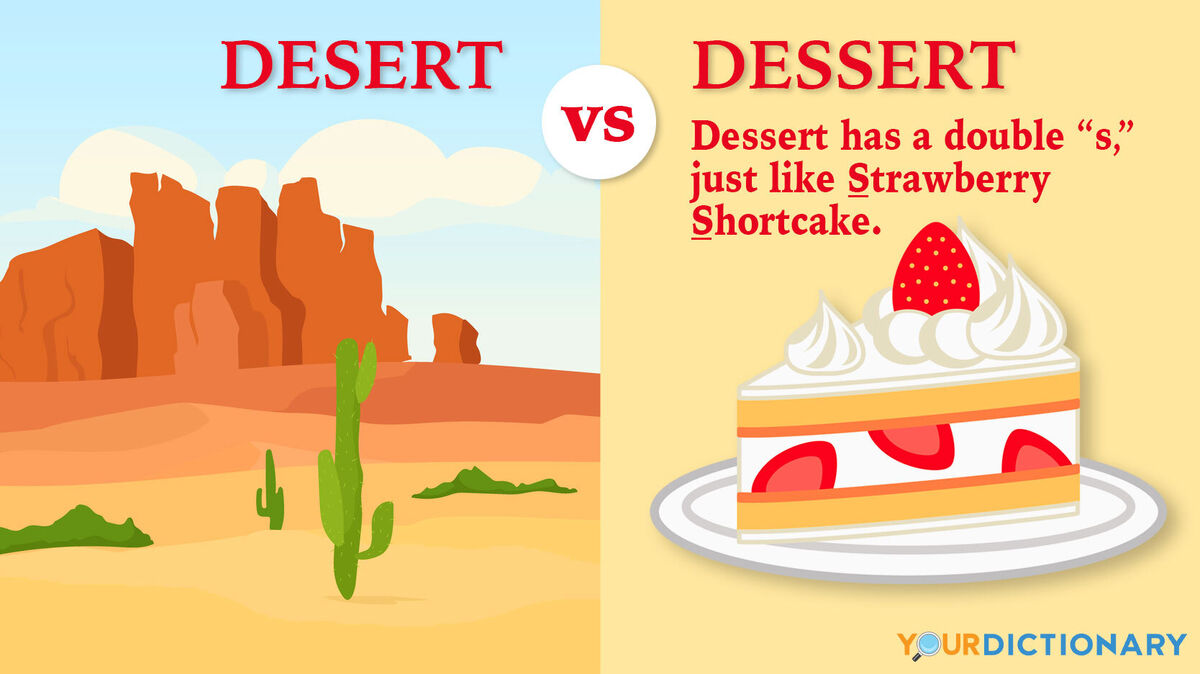
There's a big difference between a desert and a dessert — much bigger than that little "s" in the middle! But how can you easily choose the right word? Keep reading for easy tips on how to tell the difference between the words desert and dessert.
Difference Between Desert and Dessert
While these two words look similar, they mean very different things. A quick look at their definitions will help you clearly tell them apart.
- desert - (n.) barren or desolate area; (v.) to leave or abandon
- dessert - (n.) typically sweet confection served at the end of a meal
Fun Tips to Remember Desert vs. Dessert
So how can you keep these words straight? If you need a quick, intuitive way to remember the difference between desert and dessert, try out one of these tips.
- Think of the double "s" in dessert as "strawberry shortcake" — a popular dessert. (You can also think of the single "s" in desert as "sand.")
- Would you rather have a second scoop of dessert or of desert? That's why dessert has a double "s" — everyone wants two scoops!
- Feeling stressed? Desserts, which is stressed spelled backward, is much more helpful than a desert.
- You're alone in the desert, just like the poor "s" in the middle of the word.
- What do you use to eat dessert? A "silver spoon" — double "s" like dessert!
- You've finished your dinner and you're reading for your "second serving" of dessert (double "s").
- If you can remember their origins, you may notice how desertum has one "s," like desert, and desservir has two, like dessert.
The Multiple Meanings of Desert
Of the two words, desert is the only one that you can use as multiple parts of speech. It can be a noun, verb or adjective. Depending on the context, it can mean very different things and is even pronounced in different ways.
How to Use Desert as a Noun
The word desert is most commonly used as a noun. Its most common meaning is:
desert (n; DEH-zert) - a biome on planet Earth that is characterized by barren land and by a lack of water and plant life
The word desert comes from the Latin desertum, which means "an abandoned thing" or "a wasteland." In this case, it can describe a large expanse of sand or ice (such as Antarctica) where hardly anything can grow. For example:
We were dehydrated and sunburned by the time we crossed the desert.
The Sahara is the biggest non-polar desert in the world.
Many animals, including camels and lizards, have adapted to the harsh conditions of the desert.
How to Use Desert as a Verb
Desert can also be a verb. It comes from the Latin desertus, and means:
desert (v; deh-ZERT) - to leave or abandon those who depend on you
You'll typically see this used in military or other official situations. Some examples of desert as a verb include:
Paul swore that he'd never desert his family.
The soldier was in trouble for deserting his post.
Just because I changed my mind doesn't mean I've deserted my values.
How to Use Desert as an Adjective
You can also use desert as an adjective, as in the phrase "desert island." The adjective form means:
desert (adj; DEH-zert) - an area that is unoccupied or desolate
It's based on the same Latin root as the other two meanings, which refer to an abandoned or lifeless place. Example sentences include:
Our lifeboat washed up on a desert island in the Pacific Ocean.
The severe drought left the riverbed looking like a desert wasteland.
We looked up and down the desert beach for survivors.
Desert can also be used as an adjective in the form deserted. For example, “This place is deserted” or “You deserted me.”
The Single Meaning of Dessert
Unlike desert, dessert only has one meaning.
dessert (n; deh-ZERT) - sweet course served after a meal that can include cake, ice cream, cookies, or other sweets
It comes from the French desservir, which means "to clear the table" or literally, "unserving," as des- means "removing" and servir means "to serve." Examples of dessert in a sentence include:
What are you going to order for dessert?
Sherry is a popular type of dessert wine.
My brother's favorite dessert is a root beer float.
Just Deserts or Just Desserts?
A phrase that further confuses matters is the old saying "just deserts," which means "the appropriate punishment." You've probably heard it before, and know that it's pronounced "just deh-ZERTS," so it's easy to assume that it should be spelled "just desserts." But that doesn't make any sense if desserts only means "sweet treat!"
Additionally, an old definition of desert is "consequence or punishment. Just in this case means "justice." So if someone has been served their "just deserts," they're not being served cake or pie. They've received the proper punishment for their crime. So while "just desserts" is often written and is often accepted, the correct form is "just deserts."
Don't Desert Your Spelling Practice
Between word origins and the ever-changing nature of the English language, spelling can be hard to master. However, now that you know the key differences between desert and dessert, there's no stopping your spelling progress. Keep the lesson going with these tips on loose vs. lose. Or stick with foods and explore the differences between supper vs. dinner.